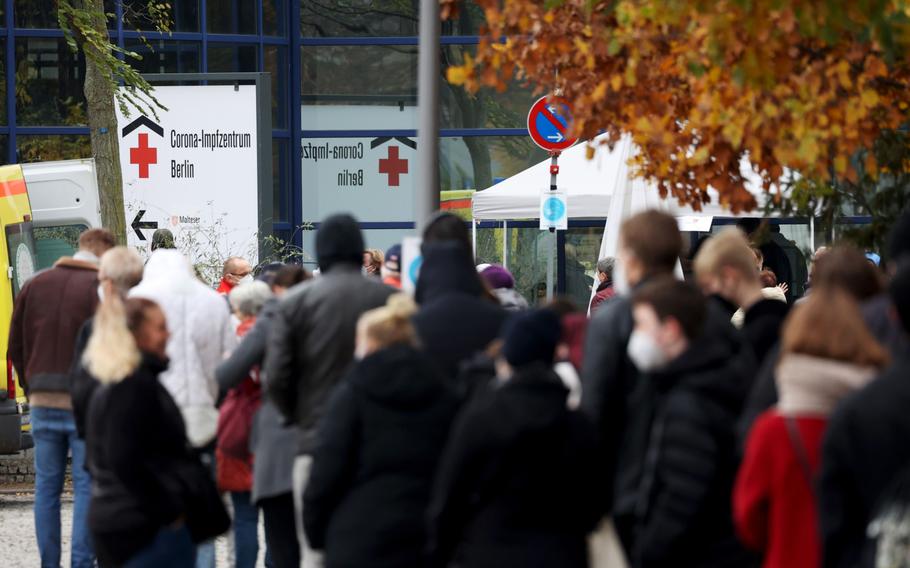
Visitors queue for Covid-19 vaccinations at the Messe Berlin exhibition center in Berlin on Nov. 15, 2021. MUST CREDIT: Bloomberg photo by Liesa Johannssen-Koppitz. (Liesa Johannssen-Koppitz)
VIRUS-GERMANY-BG 597 words · 1 photo Germany’s incoming chancellor urges mandatory Covid shots Germany’s incoming chancellor threw his support behind mandatory Covid-19 vaccinations as European leaders take a tougher line in a bid to check a brutal surge in infections.
During a video conference on Tuesday, Olaf Scholz told outgoing Chancellor Angela Merkel and state premiers that he would support a broad requirement to get shots, according to a person familiar with the discussions. The measure, which may not be approved at the talks, could come into force around February, according to the person, who asked not to be identified because the deliberations are private.
The move would be a major departure for the new administration after German leaders vowed for months that it would be up to citizens to decide if they wanted to take up the government’s offer to get inoculated against Covid. The soft tone may have contributed to the country’s relatively low vaccination rate of less than 70%.
“In order to get the upper hand and prevent a fifth wave, we must now prepare for a general vaccination requirement,” Robert Habeck, the incoming vice chancellor from the Greens, told news agency DPA.
Scholz, Merkel and the heads of Germany’s 16 states are discussing imposing new curbs, including restrictions on fans at soccer games and closing bars and nightclubs in hard-hit areas.
The latest surge in infections appears to have caught German authorities by surprise, and the transition to a new administration under Social Democrat Scholz has complicated pandemic coordination in Europe’s largest economy.
States led by Merkel’s conservative bloc, which is moving into opposition, also called for the new government to prepare for mandatory vaccinations, as well as hard contact restrictions for unvaccinated people, reduced capacity for large events and the shuttering of clubs, according to a document seen by Bloomberg.
Pressure has been growing ahead of the change in power and the gathering allowed the politicians to address a Constitutional Court ruling on Tuesday, which rejected challenges to measures such as nighttime curfews and closing schools. The decision could give leaders additional legal backing for a new round of tougher restrictions, but they’re unlikely to impose a widespread lockdown.
Alongside possible new measures in Germany, Norway extended quarantine rules for people testing positive for Covid, while Greece made Covid vaccines compulsory for people above 60, including a monthly fine of 100 euros ($114) a month for those who don’t comply. Switzerland and Finland also are considering tighter curbs to clamp down on public contact.
France is also bracing for a worsening outbreak. The country reported 47,000 new infections in the last 24 hours, the highest daily level since April. Health Minister Olivier Veran said during government questions in the National Assembly that by the end of this week daily cases could exceed the peak of the third wave of the virus eight months ago.
Authorities have been on high alert as the omicron variant spreads. The Dutch national health service confirmed that the strain, first identified in South Africa, was in the Netherlands a earlier than first thought after detecting two cases in test samples taken a week ago.
The European Center for Disease Prevention and Control has compiled reports of 44 cases of omicron in 11 European countries. So far, those cases have all been recorded with minor symptoms or they’re asymptomatic.
The European Medicines Agency said it would use expedited procedures to approve new versions of Covid vaccines to address omicron if the current ones provide insufficient protection. That would mean regulatory approval could be completed in three to four months after companies move forward.